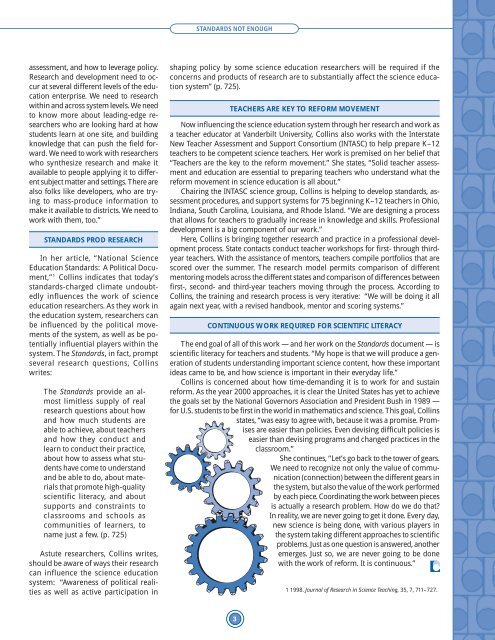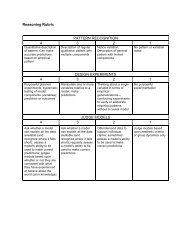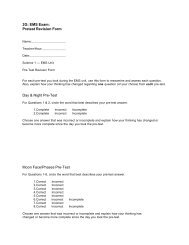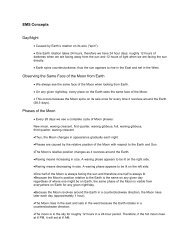Science Education Reform - National Center for Improving Student ...
Science Education Reform - National Center for Improving Student ...
Science Education Reform - National Center for Improving Student ...
You also want an ePaper? Increase the reach of your titles
YUMPU automatically turns print PDFs into web optimized ePapers that Google loves.
STANDARDS NOT ENOUGH<br />
assessment, and how to leverage policy.<br />
Research and development need to occur<br />
at several different levels of the education<br />
enterprise. We need to research<br />
within and across system levels. We need<br />
to know more about leading-edge researchers<br />
who are looking hard at how<br />
students learn at one site, and building<br />
knowledge that can push the field <strong>for</strong>ward.<br />
We need to work with researchers<br />
who synthesize research and make it<br />
available to people applying it to different<br />
subject matter and settings. There are<br />
also folks like developers, who are trying<br />
to mass-produce in<strong>for</strong>mation to<br />
make it available to districts. We need to<br />
work with them, too.”<br />
STANDARDS PROD RESEARCH<br />
In her article, “<strong>National</strong> <strong>Science</strong><br />
<strong>Education</strong> Standards: A Political Document,”<br />
1 Collins indicates that today’s<br />
standards-charged climate undoubtedly<br />
influences the work of science<br />
education researchers. As they work in<br />
the education system, researchers can<br />
be influenced by the political movements<br />
of the system, as well as be potentially<br />
influential players within the<br />
system. The Standards, in fact, prompt<br />
several research questions, Collins<br />
writes:<br />
The Standards provide an almost<br />
limitless supply of real<br />
research questions about how<br />
and how much students are<br />
able to achieve, about teachers<br />
and how they conduct and<br />
learn to conduct their practice,<br />
about how to assess what students<br />
have come to understand<br />
and be able to do, about materials<br />
that promote high-quality<br />
scientific literacy, and about<br />
supports and constraints to<br />
classrooms and schools as<br />
communities of learners, to<br />
name just a few. (p. 725)<br />
Astute researchers, Collins writes,<br />
should be aware of ways their research<br />
can influence the science education<br />
system: “Awareness of political realities<br />
as well as active participation in<br />
shaping policy by some science education researchers will be required if the<br />
concerns and products of research are to substantially affect the science education<br />
system” (p. 725).<br />
TEACHERS ARE KEY TO REFORM MOVEMENT<br />
Now influencing the science education system through her research and work as<br />
a teacher educator at Vanderbilt University, Collins also works with the Interstate<br />
New Teacher Assessment and Support Consortium (INTASC) to help prepare K–12<br />
teachers to be competent science teachers. Her work is premised on her belief that<br />
“Teachers are the key to the re<strong>for</strong>m movement.” She states, “Solid teacher assessment<br />
and education are essential to preparing teachers who understand what the<br />
re<strong>for</strong>m movement in science education is all about.”<br />
Chairing the INTASC science group, Collins is helping to develop standards, assessment<br />
procedures, and support systems <strong>for</strong> 75 beginning K–12 teachers in Ohio,<br />
Indiana, South Carolina, Louisiana, and Rhode Island. “We are designing a process<br />
that allows <strong>for</strong> teachers to gradually increase in knowledge and skills. Professional<br />
development is a big component of our work.”<br />
Here, Collins is bringing together research and practice in a professional development<br />
process. State contacts conduct teacher workshops <strong>for</strong> first- through thirdyear<br />
teachers. With the assistance of mentors, teachers compile portfolios that are<br />
scored over the summer. The research model permits comparison of different<br />
mentoring models across the different states and comparison of differences between<br />
first-, second- and third-year teachers moving through the process. According to<br />
Collins, the training and research process is very iterative: “We will be doing it all<br />
again next year, with a revised handbook, mentor and scoring systems.”<br />
CONTINUOUS WORK REQUIRED FOR SCIENTIFIC LITERACY<br />
The end goal of all of this work — and her work on the Standards document — is<br />
scientific literacy <strong>for</strong> teachers and students. “My hope is that we will produce a generation<br />
of students understanding important science content, how these important<br />
ideas came to be, and how science is important in their everyday life.”<br />
Collins is concerned about how time-demanding it is to work <strong>for</strong> and sustain<br />
re<strong>for</strong>m. As the year 2000 approaches, it is clear the United States has yet to achieve<br />
the goals set by the <strong>National</strong> Governors Association and President Bush in 1989 —<br />
<strong>for</strong> U.S. students to be first in the world in mathematics and science. This goal, Collins<br />
states, “was easy to agree with, because it was a promise. Promises<br />
are easier than policies. Even devising difficult policies is<br />
easier than devising programs and changed practices in the<br />
classroom.”<br />
She continues, “Let’s go back to the tower of gears.<br />
We need to recognize not only the value of communication<br />
(connection) between the different gears in<br />
the system, but also the value of the work per<strong>for</strong>med<br />
by each piece. Coordinating the work between pieces<br />
is actually a research problem. How do we do that?<br />
In reality, we are never going to get it done. Every day,<br />
new science is being done, with various players in<br />
the system taking different approaches to scientific<br />
problems. Just as one question is answered, another<br />
emerges. Just so, we are never going to be done<br />
with the work of re<strong>for</strong>m. It is continuous.”<br />
1 1998. Journal of Research in <strong>Science</strong> Teaching, 35, 7, 711–727.<br />
3





